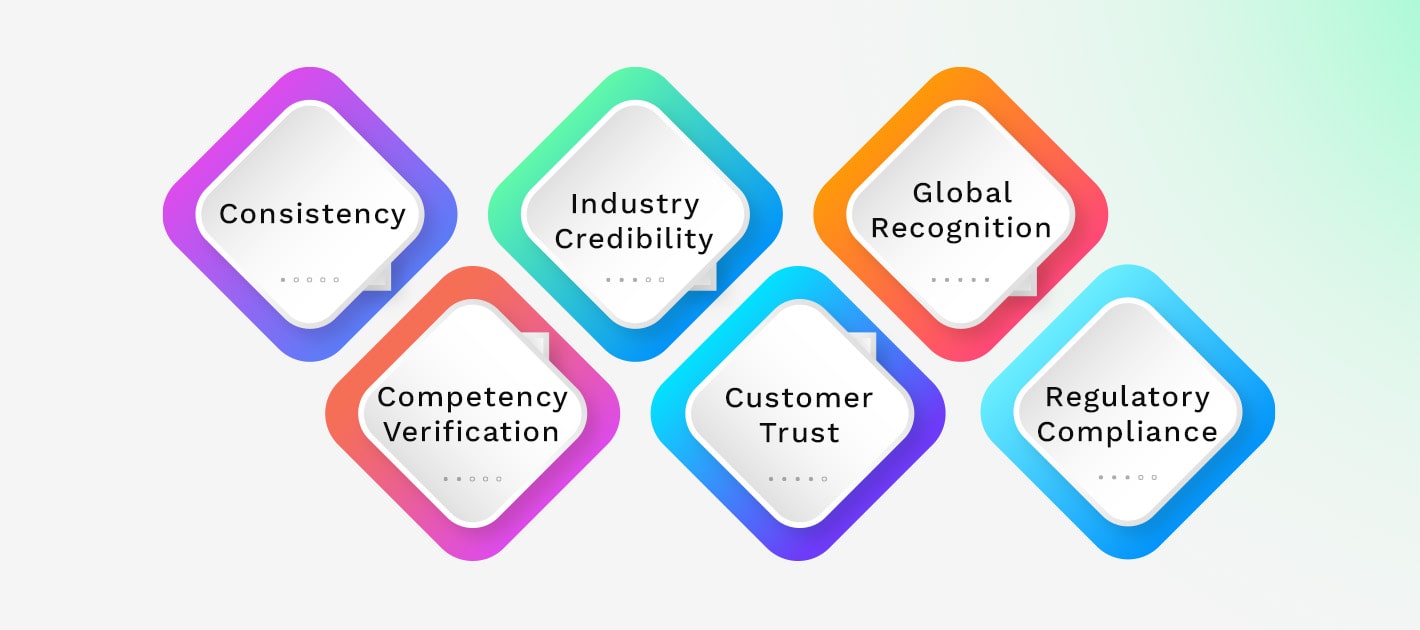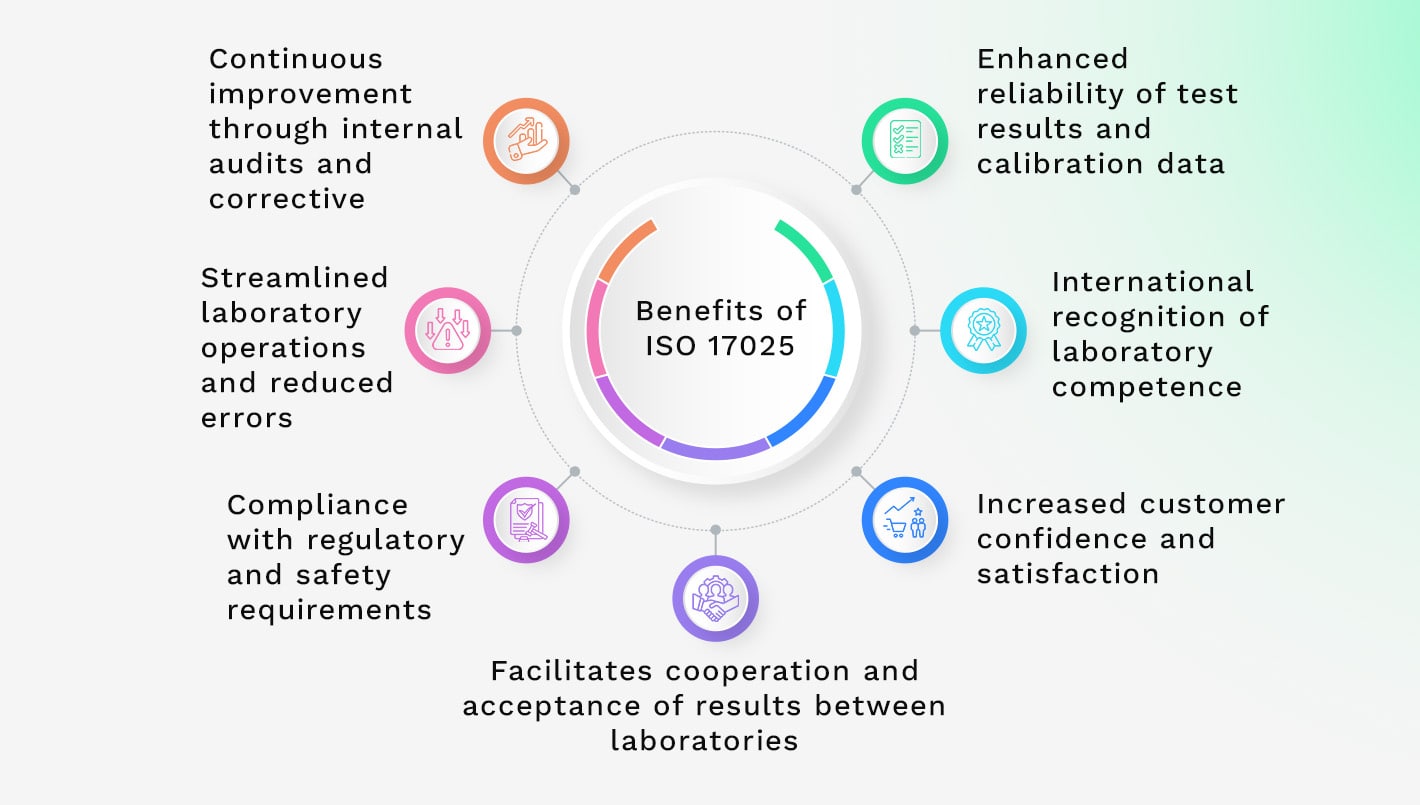ISO 17025 is a critical standard for testing and calibration laboratories worldwide. If you're in the industry, you've likely heard of it, but you might wonder exactly what it is and why it should matter to you. In this post, you'll discover the essence of ISO 17025 and its significance in maintaining quality and accuracy in laboratory settings.
We'll buid your first application for you. At no extra cost.
Let us build your first business application for free. Go from an idea to an application in under 2 weeks.

What Is ISO 17025?
ISO/IEC 17025 is the main international standard for establishing the technical competence and reliable operation of laboratories performing testing and calibration. The title reflects its development by the International Organization for Standardization (ISO) in conjunction with the International Electrotechnical Commission (IEC).
ISO 17025 contains a detailed set of criteria that these laboratories must meet to ensure that they are technically competent and capable of generating accurate and repeatable results. This standard covers everything from sampling to testing and calibration, ensuring that labs consistently follow rigorous quality management systems and valid results.
ISO 17025 is integral to any organization that performs testing or calibration and requires objective evidence that their results are reliable. Whether formally recognized as a lab or any environment producing measurable findings, adherence to this standard is important for operational credibility.
Why Is ISO 17025 Important?
The importance of ISO 17025 stems from the need to guarantee the accuracy and reliability of the results obtained from testing and calibration laboratories. Here are a few reasons why this standard is important for laboratories and their stakeholders:
- Consistency: It provides a foundation for a lab to process tasks consistently and generate repeatable results.
- Competency Verification: Accreditation to this standard ensures that laboratories have the requisite technical expertise and equipment.
- Industry Credibility: Possession of ISO 17025 certification is often seen as a mark of professionalism that is valued both nationally and internationally.
- Customer Trust: Customers and regulatory bodies see ISO 17025 accreditation as proof that a laboratory is capable of delivering services that meet the highest quality standards.
- Global Recognition: ISO 17025 accreditation facilitates mutual recognition which can reduce the need for duplicate testing, saving time and resources.
- Regulatory Compliance: Many sectors require ISO 17025 compliance for certain regulatory approvals, ensuring labs meet specific quality and performance criteria.

Who Is ISO 17025 for?
ISO 17025 is designed primarily for organizations involved in measurement science, namely testing and calibration laboratories. It's for you if you seek excellence in your laboratory procedures and aim to establish your organization's reputation for consistent quality. The standard benefits:
- Testing laboratories in industry sectors
- Calibration laboratories providing measurement services
- Governmental labs that oversee various regulatory aspects
- University and research centers conducting testing and calibration for academic purposes
- Inspection bodies and product certification organizations that require precise testing data
- Quality managers and professionals needing to demonstrate the capability of laboratories in delivering reliable testing and calibration results
No matter the size of the laboratory or the industry domain it serves, any organization that performs testing, sampling, or calibration and desires veritable data can adopt ISO 17025.
Is ISO 17025 Mandatory for Testing and Calibration Laboratories?
ISO/IEC 17025 is the main international standard for establishing the technical competence and reliable operation of laboratories performing testing and calibration. The title reflects its development by the International Organization for Standardization (ISO) in conjunction with the International Electrotechnical Commission (IEC).
ISO 17025 contains a detailed set of criteria that these laboratories must meet to ensure that they are technically competent and capable of generating accurate and repeatable results. This standard covers everything from sampling to testing and calibration, ensuring that labs consistently follow rigorous quality management systems and valid results.
ISO 17025 is integral to any organization that performs testing or calibration and requires objective evidence that their results are reliable. Whether formally recognized as a lab or any environment producing measurable findings, adherence to this standard is important for operational credibility.
Benefits of ISO 17025
Enhanced reliability of test results and calibration data
Achieving ISO 17025 accreditation assures stakeholders that the lab delivers results you can rely on. It signifies that the facilities have been thoroughly audited, staff qualifications are vetted, and test methodologies are approved for consistency, promoting reliability in every result that comes out of the lab and trust in the precision of the laboratory's work.
International recognition of laboratory competence
ISO 17025 showcases your laboratory's ability to meet internationally recognized standards, aligning with the best in the world. Test reports and calibration certificates from ISO 17025 accredited labs are recognized internationally, opening doors to global markets. The standard reduces technical trade barriers, simplifying the import and export processes for goods requiring testing and enabling you to operate anywhere in the world as a trusted partner.
Increased customer confidence and satisfaction
ISO 17025 accreditation is a powerful trust-builder for laboratories, providing customers with the assurance that testing and calibration tasks are performed correctly. The standard places importance on customer feedback, fostering a responsive and customer-centric service. It also requires laboratories to rigorously investigate issues and inform clients about how they were resolved. Satisfied customers are more likely to return, knowing that the reliability of the results is as consistent as it is robust.
Facilitates cooperation and acceptance of results between laboratories
ISO 17025 smooths the way laboratories work together and accept each other's data with confidence by establishing a unified language and processes that labs around the world recognize and trust. It also propels the harmonization of testing methods, often leading to benchmarks that can be universally applied, and enables laboratories to share best practices and technological advancements.
Compliance with regulatory and safety requirements
ISO 17025 ensures that laboratories not only meet but exceed the requirements set by regulators for safety and compliance. It is proof that safety protocols are enforced and refined to protect both staff and consumers from potential harm. Compliance reduces the risk of non-conformance with industry regulations, which could result in fines or operational shutdowns. It also strengthens a laboratory's position in the case of legal challenges, showing a commitment to maintaining recognized standards.
Streamlined laboratory operations and reduced errors
ISO 17025 streamlines procedures, thereby eliminating unnecessary steps and focusing energy on what truly matters. The standard requires rigorous quality control, which drastically reduces the incidence of errors and the need for retesting. Optimized processes also reduce turnaround times, making them more competitive. Reduced rework and increased efficiency ultimately mean cost savings, which can be reinvested into the lab's growth and innovation.
Continuous improvement through internal audits and corrective actions
ISO 17025 places a strong emphasis on continuous improvement through regular internal audits that laboratories conduct to assess the effectiveness of their Quality Management System (QMS) and identify areas for improvement. The standard also ensures that any issues identified are fixed promptly and that staff are continually trained and upskilled to adapt to new methods, technologies, and requirements.

How to Attain ISO 17025 Accreditation?
In the US, ISO/IEC 17025 certification is provided by either the American Association for Laboratory Accreditation (A2LA) or the ANSI National Accreditation Board (ANAB). Similar organizations exist worldwide, such as the International Accreditation Service (IAS), and there are also national-level bodies in other countries like UKAS (United Kingdom), DANAK (Denmark), and COFRAC (France).
Achieving ISO 17025 accreditation is a process that includes the following key steps:
- Engage Senior Management: Start by ensuring that the management understands the value and commits the necessary resources.
- Define Scope and Procedures: Clearly articulate the tests or calibrations that your lab will perform and develop precise procedures for each.
- Assign Roles and Responsibilities: Everyone in the lab should know their tasks and responsibilities, especially concerning quality management.
- Risk Evaluation: Address potential risks and opportunities to your processes, aiming at minimizing the former and capitalizing on the latter.
- Implement the QMS: Put your defined processes into action, integrate them into daily lab activities, and train staff on these new or revised procedures.
- Internal Audit and Corrective Actions: Carry out an internal audit, identify non-conformities, and implement necessary changes.
- Select an Accreditation Body: Choose an appropriate, recognized accreditation body to partner with for the external assessment.
- Undergo External Assessment: Collaborate with the accreditation body to evaluate your lab's compliance with ISO 17025.
- Address Any Findings: After the audit, address any findings promptly to comply fully with the standard.
- Acquire Accreditation: Once you meet all the criteria, the accreditation body will grant you ISO 17025 accreditation.
How to Maintain Your ISO 17025 Accreditation?
Attaining accreditation is not the end. It's a new beginning where you commit to maintaining these high standards consistently. To maintain accreditation, an accreditation body like A2LA or ANAB will review your processes for any violations of ISO 17025 compliance every year. They will conduct an on-site audit every other year, and a complete re-assessment every four years.
Here's a routine to help you stay on track:
- Continual Training: Regularly update training programs to keep up with the best practices and any changes in the standard.
- Routine Internal Audits: These audits should be conducted regularly to consistently evaluate your processes to identify and rectify non-conformities.
- Manage Changes Effectively: Manage changes wisely to ensure compliance, regardless of whether it's new technology or a shift in organizational structure.
- Stay Up-to-Date: Keep up with any updates or revisions to the ISO 17025 standard and integrate them into your quality management system.
- Preparation for Surveillance Audits: Stay audit-ready always, as periodic assessments from the accrediting body will take place to ensure ongoing compliance.
- Focus on Customer Feedback: Use customer feedback as a compass for quality improvement and satisfaction measures.
- Engage in Proficiency Testing: Regularly participate in proficiency testing or inter-laboratory comparisons to benchmark your results against others.
Conclusion
ISO 17025 accreditation is a fundamental blueprint for laboratories seeking to establish and maintain exceptional levels of performance, reliability, and efficiency. Committing to this standard helps you open the doors to new markets and customer segments, fostering a culture of continuous improvement.
Start building with a free account
Frequently Asked Questions
An ISO 17025 audit checklist typically includes criteria covering the standard's main elements, such as general requirements for impartiality and confidentiality, resource requirements including personnel and equipment, process requirements that deal with testing methodologies, and management system requirements for consistent operation. The checklist is crucial to ensure every requisite for accreditation is reviewed and satisfied.
Individual professionals cannot get ISO 17025 certified as the accreditation is granted to laboratories, not individuals. However, professionals can become knowledgeable about the standard through training courses to enhance career prospects within the industry.
Achieving ISO 17025 accreditation involves financial implications such as initial costs, ongoing maintenance, staff training, and accreditation body fees. While there is an upfront investment, the long-term benefits including reduced rework, heightened efficiency, fewer customer complaints, and access to more contracts outweigh these costs, leading to a positive net impact over time.

